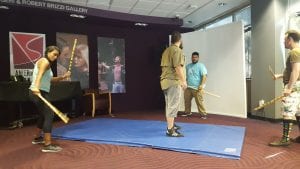October 15, 2019 | By Sheila Cowley
My job is to tell a story
and take care of everybody in the room.
 Dan Granke is well known as a Fight Director at area theaters from the Asolo to Tampa Rep. He teaches acting, mask work and combat at the USF School of Theatre and Dance.
Dan Granke is well known as a Fight Director at area theaters from the Asolo to Tampa Rep. He teaches acting, mask work and combat at the USF School of Theatre and Dance.
What many people don’t realize is that Dan Granke’s one of only eight Lead Instructors in the country, in the relatively new field of Intimacy Direction — a growing practice that aims to handle physical intimacy onstage and onscreen with the same care and professionalism given to a precisely choreographed fight scene.
It’s a new and welcome practice for actors, since most performers have experienced being thrown into physical intimacy with little or no guidance. The Arts Coast Journal talked with Dan about the fine art of directing intimate scenes in performance.
. . .
DAN GRANKE: Our job is primarily like any other like any other specialist in the theater. Our job is to take a very small part of the play — usually a very important part of the play — and bring a practiced expert eye to it.
‘Intimacy’ covers a wide range of physical contact and sometimes even non-physical contact, when we do emotional work with actors who are having trouble with chemistry or connecting.
My job is to go in primarily to make sure the intimacy looks good and make sure that all intimacy onstage is consensual and done without any sort of coercion.
Our role is to create a working environment where everybody has a full and co-equal voice in the creation of the moment. And where everyone feels empowered to speak about their own boundaries as well as their own creative impulses and desires.
You can tell when somebody’s doing something they’re not 100% confident in doing. And I want to say, ‘confident,’ not comfortable — because one of the things about this type of work is, it’s not always comfortable to do, and that’s okay.
Even stage combat falls under the umbrella of intimacy. It’s contact, with this intense emotional investment.
Intimacy Directors help actors grapple with what the character they’re playing is doing — and help make it clear that it’s not the actor personally, who is doing that. That sense of separation helps actors handle playing a dark and negative character — and helps actors avoid feeling like they’re actually falling in love with their erotic scene partner.

Dan explains that he and other theatre professionals have been invited into rehearsals to do this kind of work on an informal basis for years — to take a look at a kiss, an embrace. It’s only in recent years that Intimacy Direction has become a formal practice with set methods and techniques.
Dan works with Intimacy Directors International. You can read their professional guidelines for theatre here. Their practice focuses on Context, Communication, Consent, Choreography and Closure.
. . .
. . .
DAN GRANKE: Context is ‘What’s the story? What’s the thing we’re telling? Why is this action necessary? Is this action necessary? What effect do we want to have on our audience? Who is our audience?’ Audiences are different, their reactions to things are gonna be different.
Then there’s Communication, making sure that we have the free-flowing and open ability to talk to each other. Consent, which is critical – again everybody has to be fully consenting to everything.
We believe that [physical intimacy onstage] needs to have a Choreographed pattern or at least containers of ‘this is what we’re gonna do, we’re gonna go here, we’re going to do this.’ Because you can’t consent to something that isn’t specific.
And lastly we have Closure – we need to make sure that everybody is is able to take what we do onstage and compartmentalize it and say that’s not a part of me.
Anything you do onstage? Your body doesn’t know the difference.
Your mind can know the difference between what I’m doing onstage — and when I get offstage, it’s not real. But your body doesn’t know. Your body experiences the physiological reactions to whatever you do, even if it’s pretend.
Dan explains how difficult it is when actors are asked to do something they’re not comfortable with, by a director or producer who can decide whether to hire them again.
DAN GRANKE: We have a culture that is very hierarchical and one where your job is to say yes to the people who have power. You have to say yes — yes and is one of the rules of improv and that’s not wrong.
There are power dynamics. You are getting paid. If I’m an actor and they ask me to get naked at the last minute and I feel like I have to do it because it’s money, it’s my career — you start to associate the idea of your career with having to cross that boundary.

Intimacy Directors International draws a line between Intimacy Direction for Theatre and Intimacy Coordination for Film and Television. Dan prefers theatre.
DAN GRANKE: One thing that drew me to the work is I think of myself first and foremost as a director. I love directing whole pieces but when I’m directing a fight or a kiss, I’m just going to direct the most exciting 30 seconds to a minute.
It’s the same skill set in terms of telling a story, about how an audience is reacting, helping actors understand that and helping actors deliver the story in a way that’s clear and moves the audience.
One of the moments I’m the most proud of on a recent project was just adjusting the way these two people are holding hands. There was this sigh that went through the whole room, this awww.
It was just the smallest adjustment — one character had their hands on the other character’s face, and rather than losing that contact the other character just took their hands, and pulled them down, and held them during the next few lines. And it changed everything.
So it’s those little details that really make the difference between everybody going ‘Oh, okay I see it’ and everybody going ‘Well, I really understand how deeply these two people are connecting right now,’ through that simple gesture.
That’s the kind of stuff most Intimacy work is.
Intimacy Direction changed the way I do everything.
It makes everything I do run a better engine, because my artistic collaboration
is so much more open and inclusive.
This year, Dan will serve as Intimacy Director on productions ranging from Tampa Rep’s Stupid F@%% Bird and Urbanite Theatre’s upcoming Sender, to the current production of Qui Nguyen’s Vietgone at American Stage.

DAN GRANKE: Vietgone has a ton of intimacy. For those who don’t know Qui Nguyen’s work, Qui was first and foremost of a comic book superhero playwright, writing stories that involved a lot of stage combat and heroes and villains and exciting adventure.
In Vietgone, he still has all the story of this exciting adventure and these sort of comic book scenes — but it’s really the story of how he came to be. How his parents met and fell in love when they were both refugees in America. You see the two of them slowly start to fall in love and have a relationship.
It’s really cool. it’s topical, it’s filled with humor. It’s filled with all kinds of adventure and action, but it’s still just a wonderful love story.
There are moments when we’re staging homages to famous intimate scenes that are really fun and funny. There are many kisses in the play.
One of the hardest things is when there’s an action that’s repeated multiple times in the script. One of the keys it is to make sure that they don’t all look the same — because they’re not all the same — and if they look the same, that’s weird. Each one tells a different story and each is part of the progress through this relationship. And so we have to really make sure we tell those stories clearly, cleanly. And that’s where having a specialized eye is really helpful.
Find out more about
Intimacy Directors International
at teamidi.org
Qui Nguyen’s Vietgone
is at American Stage
Through November 3
Details here


